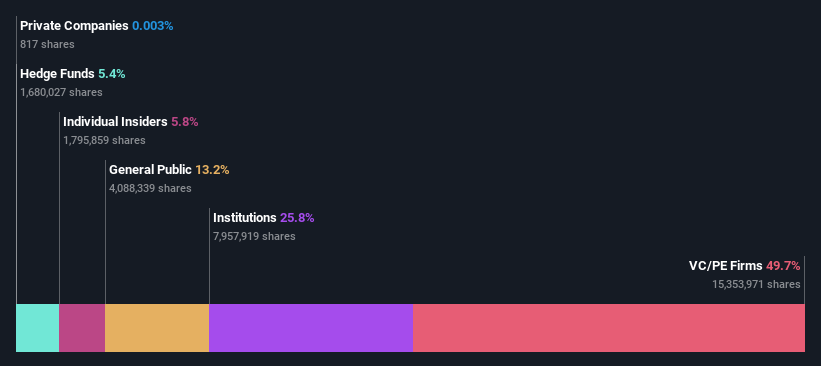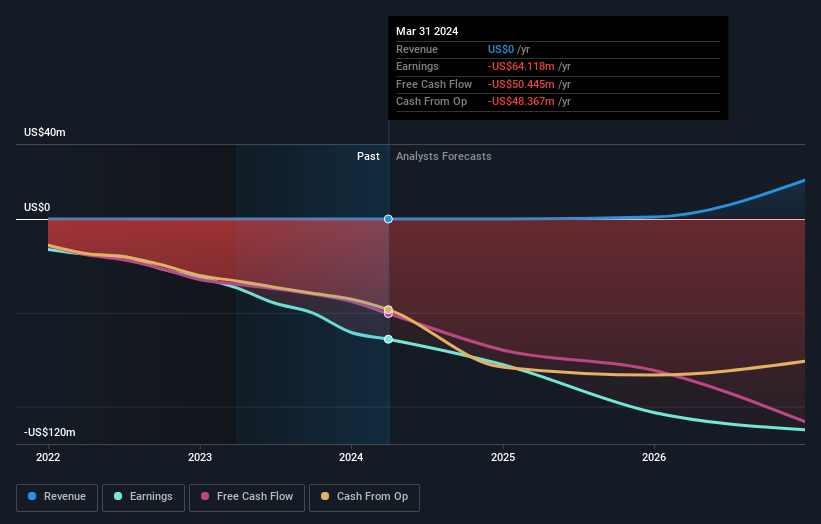- United States
- /
- Biotech
- /
- NasdaqGM:ACRV
Private equity firms who have a significant stake must be disappointed along with institutions after Acrivon Therapeutics, Inc.'s (NASDAQ:ACRV) market cap dropped by US$29m

Key Insights
- Acrivon Therapeutics' significant private equity firms ownership suggests that the key decisions are influenced by shareholders from the larger public
- 57% of the business is held by the top 3 shareholders
- Institutions own 26% of Acrivon Therapeutics
If you want to know who really controls Acrivon Therapeutics, Inc. (NASDAQ:ACRV), then you'll have to look at the makeup of its share registry. We can see that private equity firms own the lion's share in the company with 50% ownership. That is, the group stands to benefit the most if the stock rises (or lose the most if there is a downturn).
Following a 11% decrease in the stock price last week, private equity firms suffered the most losses, but institutions who own 26% stock also took a hit.
Let's take a closer look to see what the different types of shareholders can tell us about Acrivon Therapeutics.
View our latest analysis for Acrivon Therapeutics

What Does The Institutional Ownership Tell Us About Acrivon Therapeutics?
Many institutions measure their performance against an index that approximates the local market. So they usually pay more attention to companies that are included in major indices.
Acrivon Therapeutics already has institutions on the share registry. Indeed, they own a respectable stake in the company. This implies the analysts working for those institutions have looked at the stock and they like it. But just like anyone else, they could be wrong. It is not uncommon to see a big share price drop if two large institutional investors try to sell out of a stock at the same time. So it is worth checking the past earnings trajectory of Acrivon Therapeutics, (below). Of course, keep in mind that there are other factors to consider, too.

It looks like hedge funds own 5.4% of Acrivon Therapeutics shares. That catches my attention because hedge funds sometimes try to influence management, or bring about changes that will create near term value for shareholders. RA Capital Management, L.P. is currently the largest shareholder, with 27% of shares outstanding. In comparison, the second and third largest shareholders hold about 17% and 12% of the stock. Additionally, the company's CEO Peter Blume-Jensen directly holds 4.2% of the total shares outstanding.
After doing some more digging, we found that the top 3 shareholders collectively control more than half of the company's shares, implying that they have considerable power to influence the company's decisions.
Researching institutional ownership is a good way to gauge and filter a stock's expected performance. The same can be achieved by studying analyst sentiments. There are plenty of analysts covering the stock, so it might be worth seeing what they are forecasting, too.
Insider Ownership Of Acrivon Therapeutics
The definition of an insider can differ slightly between different countries, but members of the board of directors always count. The company management answer to the board and the latter should represent the interests of shareholders. Notably, sometimes top-level managers are on the board themselves.
Insider ownership is positive when it signals leadership are thinking like the true owners of the company. However, high insider ownership can also give immense power to a small group within the company. This can be negative in some circumstances.
We can see that insiders own shares in Acrivon Therapeutics, Inc.. As individuals, the insiders collectively own US$15m worth of the US$250m company. This shows at least some alignment. You can click here to see if those insiders have been buying or selling.
General Public Ownership
The general public-- including retail investors -- own 13% stake in the company, and hence can't easily be ignored. While this size of ownership may not be enough to sway a policy decision in their favour, they can still make a collective impact on company policies.
Private Equity Ownership
With a stake of 50%, private equity firms could influence the Acrivon Therapeutics board. Sometimes we see private equity stick around for the long term, but generally speaking they have a shorter investment horizon and -- as the name suggests -- don't invest in public companies much. After some time they may look to sell and redeploy capital elsewhere.
Next Steps:
While it is well worth considering the different groups that own a company, there are other factors that are even more important. Take risks for example - Acrivon Therapeutics has 5 warning signs (and 3 which are significant) we think you should know about.
If you would prefer discover what analysts are predicting in terms of future growth, do not miss this free report on analyst forecasts.
NB: Figures in this article are calculated using data from the last twelve months, which refer to the 12-month period ending on the last date of the month the financial statement is dated. This may not be consistent with full year annual report figures.
New: Manage All Your Stock Portfolios in One Place
We've created the ultimate portfolio companion for stock investors, and it's free.
• Connect an unlimited number of Portfolios and see your total in one currency
• Be alerted to new Warning Signs or Risks via email or mobile
• Track the Fair Value of your stocks
Have feedback on this article? Concerned about the content? Get in touch with us directly. Alternatively, email editorial-team (at) simplywallst.com.
This article by Simply Wall St is general in nature. We provide commentary based on historical data and analyst forecasts only using an unbiased methodology and our articles are not intended to be financial advice. It does not constitute a recommendation to buy or sell any stock, and does not take account of your objectives, or your financial situation. We aim to bring you long-term focused analysis driven by fundamental data. Note that our analysis may not factor in the latest price-sensitive company announcements or qualitative material. Simply Wall St has no position in any stocks mentioned.
About NasdaqGM:ACRV
Acrivon Therapeutics
A clinical stage biopharmaceutical company, engages in developing oncology medicines for the patients whose tumors are predicted to be sensitive to each specific medicine by utilizing its proteomics-based patient responder identification platform.
Flawless balance sheet slight.
Market Insights
Community Narratives


